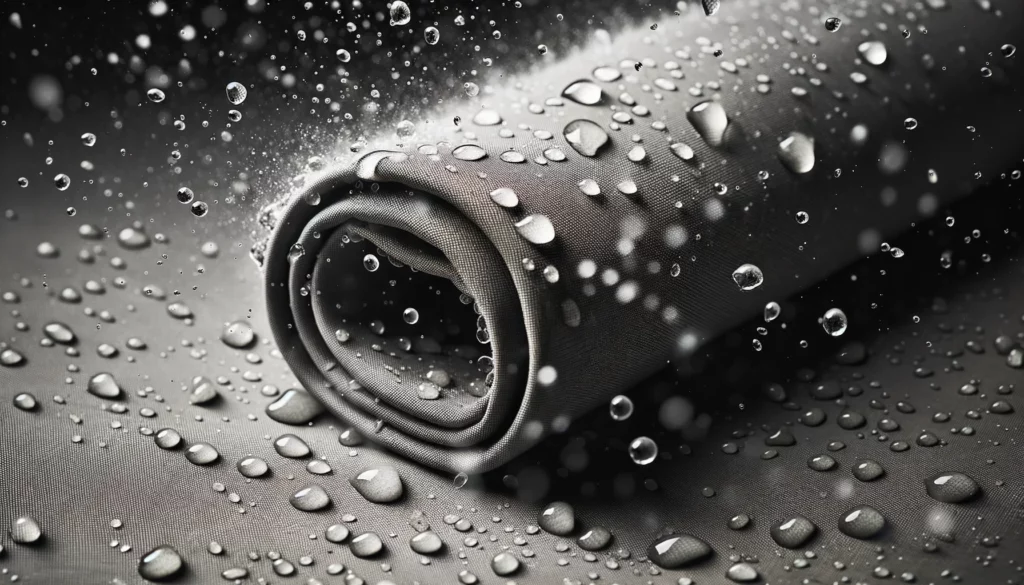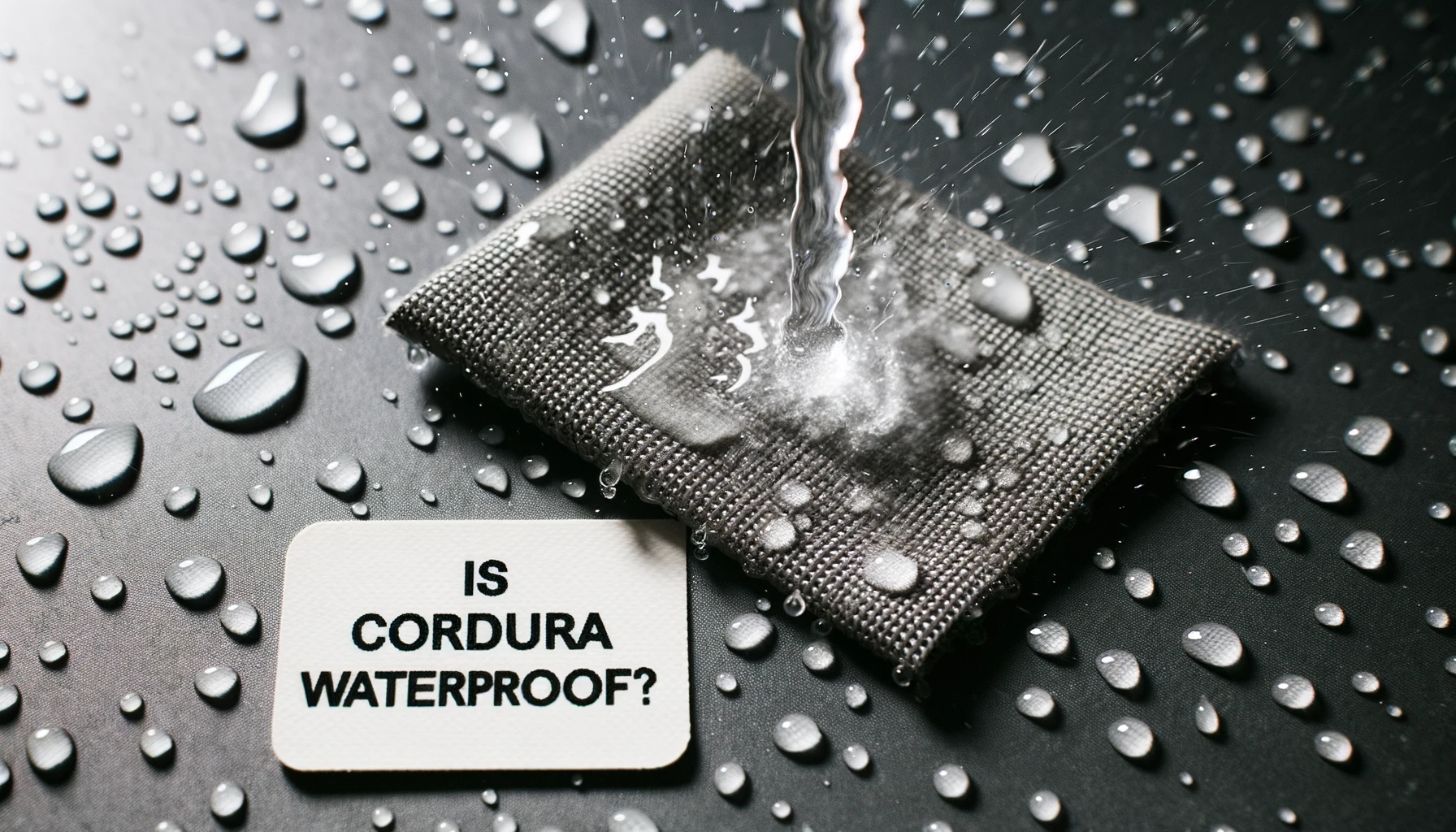Cordura is a renowned fabric, celebrated for its resilience and versatility. Predominantly used in items where strength is paramount, it’s no wonder many often inquire about its water-resistant properties.
Knowing the properties of fabrics like Cordura is vital, especially if they’re being considered for outdoor or heavy-duty use.
Quick Summary
- Cordura is a durable, lightweight, and abrasion-resistant fabric.
- It’s inherently water-resistant, but not entirely waterproof.
- Enhancements, such as DWR coatings, can boost Cordura’s water resistance.
- With time and wear, Cordura’s water resistance can be compromised.
- DIY and professional treatments can help enhance its waterproofing.
- Cordura stands distinct when compared with fabrics like nylon and polyester regarding water resistance.
Contents
Understanding Cordura: A Quick Overview
- Originally designed in the late 20th century: Cordura’s roots trace back several decades. Its design aimed at producing a fabric that combined durability with flexibility, positioning it as a valuable choice for various applications.
- Products ranging from backpacks to military gear: Cordura’s adaptability and resilience have made it the fabric of choice for many industries. Backpack manufacturers admire its ability to withstand the rugged outdoors, while military organizations trust it to protect equipment and personnel in challenging scenarios.
Basic Properties of Cordura
- Strength and Durability: Cordura’s tightly woven structure contributes to its high resistance against tears and punctures. This ensures that products made from it have a longer lifespan than many other fabrics.
- Abrasion Resistance: One of Cordura’s standout features is its ability to resist wear from regular use. Whether it’s from constant contact with surfaces, like in the case of backpacks, or from rugged work conditions, Cordura remains unaffected by the majority of abrasions.
- Lightweight Nature: Even with all its strength and durability, Cordura is remarkably light. This lightness ensures that wearables, such as jackets or pants, remain comfortable even for prolonged use.
Is Cordura Naturally Waterproof?
No, Cordura is basically thick nylon, which is not waterproof. However, its thickness makes it more waterproof than thin nylons.

Cordura is inherently water-resistant: Cordura fibers are woven in a manner that naturally repels water. While it won’t soak up rain or spills, this doesn’t mean it’s impervious to water under more extreme conditions or extended exposure.
Difference between water-resistant and waterproof: Think of water-resistant materials as having the ability to repel water to a certain extent, much like an umbrella. Waterproof materials, on the other hand, are designed to prevent water penetration completely, similar to a rubber rain boot.
Factors Enhancing Cordura’s Water Resistance
While Cordura naturally repels water, various treatments can elevate this property, making it more resistant to the wet world.
- Coating Treatments: The DWR (Durable Water Repellent) coating, when applied to Cordura, creates a surface where water droplets bead up and roll off instead of soaking in. This makes it harder for moisture to penetrate the fabric.
- Lamination Processes: Laminating Cordura with a waterproof layer acts as an additional barrier to water. This process can be likened to adding a protective shield that stops water at its tracks.
- Maintenance: Just like a car performs better with regular maintenance, Cordura’s water-resistant properties can be prolonged with proper care. This includes cleaning it with suitable detergents and ensuring it’s stored correctly, and reapplying DWR regularly.
Limitations of Cordura’s Water Resistance
No fabric is without its limitations, and Cordura is no exception. Knowing its boundaries ensures optimal performance.
- Extended exposure to water might cause seepage: While Cordura can handle light rain or accidental spills, being subjected to water for an extended period, like in a heavy downpour, might see some moisture seeping through.
- Wear and tear over time can compromise its resistance: As with all materials, time can take its toll. If a Cordura product starts showing signs of wear, its ability to repel water might diminish.
- Different grades or types of Cordura: Cordura comes in various grades, often measured in denier. A higher denier usually indicates better durability, but it’s essential to understand the specific type you’re dealing with, as it might have varying water-resistant properties.
How to Make Cordura Products More Waterproof
- DIY Waterproofing: There are various sprays and waxes available that can be applied to Cordura to enhance its waterproofing. These applications create a barrier on the fabric’s surface, making it more difficult for water to penetrate.
- Professional Treatments: Some specialized treatments can only be applied professionally. These treatments often last longer and offer superior water resistance compared to DIY solutions.
- Care: Over time, dirt and oils can degrade Cordura’s water-resistant coatings. Regular cleaning and proper storage can help in retaining these coatings, ensuring that the fabric remains water-resistant for a longer time.
Comparison with Other Fabrics
With so many fabrics out there, how does Cordura stack up, especially concerning water resistance?

- Cordura vs. Nylon: Both Cordura and nylon are part of the same synthetic polymer family. However, while nylon is celebrated for its softness and flexibility, Cordura’s construction makes it more robust and resistant to abrasion. This doesn’t necessarily mean that Cordura is vastly superior to nylon in all aspects. Still, when it comes to water resistance and durability, especially in rugged conditions, Cordura tends to have an edge.
- Cordura vs. Polyester: Polyester, another synthetic fiber, is well-regarded for its retention of shape and resistance to wrinkles. However, when directly comparing it to Cordura in terms of durability and water resistance, Cordura tends to outshine. While polyester might be favored for indoor uses and clothing due to its lightness and elasticity, Cordura stands out for outdoor and heavy-duty applications.
Practical Applications of Cordura
- Outdoor Gear: Given its durability and water resistance, Cordura shines in the manufacture of outdoor gear. From tents that withstand windy conditions to hiking boots that tread rugged terrains, the usage of Cordura guarantees a product that can endure the challenges of the great outdoors.
- Military and Tactical Equipment: The military and tactical sectors require gear that won’t give up easily. Cordura’s high tear resistance and general toughness make it a preferred choice for uniforms, vests, and other protective gear. Its ability to repel water adds another layer of utility in diverse combat situations.
- Workwear: Jobs that involve manual labor or exposure to challenging environments need outfits that can take a beating. Cordura’s resistance to abrasions, tears, and, to an extent, water, makes it a favorite among workers in sectors like construction, mechanics, and outdoor maintenance.
Taking Care of Your Cordura Products
- Cleaning: Using mild soaps or detergents without harsh chemicals preserves the fabric’s integrity. Always follow the manufacturer’s cleaning instructions, as different Cordura products might have unique coatings or treatments.
- Drying: High heat can damage Cordura fibers and any water-resistant treatments. Air drying is recommended. If you must use a machine, opt for the lowest heat setting.
- Storage: Avoid storing Cordura products in damp or overly humid environments. Such conditions can degrade the fabric and any water-resistant treatments over time. Regularly airing out items, especially after exposure to wet conditions, ensures longevity.
Tips for Choosing Cordura Products
- Check the Denier: The denier measurement gives an indication of the fabric’s thickness. While a higher denier often suggests better durability, it might also mean a slightly heavier product. Match the denier to your specific needs.
- Waterproofing Claims: Always be wary of claims. If a product claims to be ‘waterproof,’ delve into the details. Is it treated with an additional layer? What are the real-world reviews like? These questions can help distinguish between genuinely water-resistant products and marketing hype.
- Warranty: A good warranty often suggests the manufacturer’s confidence in the product. A Cordura product with an extended warranty can be a sign of its quality and durability.
Conclusion
Cordura, with its innately water-resistant properties, stands tall as a fabric of choice for many heavy-duty applications. While it’s not entirely waterproof, with the right treatments and care, it can come close. Recognizing and maintaining these traits ensures products made of Cordura perform optimally.
Frequently Asked Questions
1. How does Cordura handle UV radiation and sunlight exposure? Cordura has been designed with outdoor use in mind, which means it exhibits good resistance to UV radiation. However, like all fabrics, prolonged exposure to direct sunlight can cause some degree of fading over time. It’s always a good idea to store Cordura products away from direct sunlight when not in use to maximize their lifespan.
2. Is Cordura eco-friendly or recyclable? Cordura, being a synthetic fabric, isn’t as eco-friendly as natural fibers. However, some manufacturers have taken steps to produce recycled Cordura using post-consumer waste. It’s essential to check product labels if this is a concern for you. Moreover, the durability of Cordura can be seen as eco-friendly in the sense that products made from it tend not to need replacing as often, reducing waste.
3. How does Cordura feel against the skin? While Cordura is primarily known for its durability, it might not be as soft as fabrics like cotton or bamboo when in direct contact with the skin. However, many manufacturers combine Cordura with other fabrics or line products to ensure they’re comfortable when worn.
4. Are there any common allergens or irritants in Cordura? Cordura itself is made from synthetic polymers and doesn’t naturally contain common allergens. However, some people might be sensitive to certain dyes or treatments applied to the fabric. If you have sensitive skin or known allergies, it’s a good idea to check the product details and perhaps opt for untreated or naturally dyed Cordura products.
5. How does Cordura fare in extreme temperatures? Cordura is known for its resilience, and this extends to temperature extremes. It remains flexible and doesn’t become brittle in cold temperatures. Likewise, in hot conditions, it doesn’t melt or degrade easily. However, it’s always a good idea to avoid exposing Cordura products to extreme heat sources like open flames or heaters, as this can damage the fabric.




